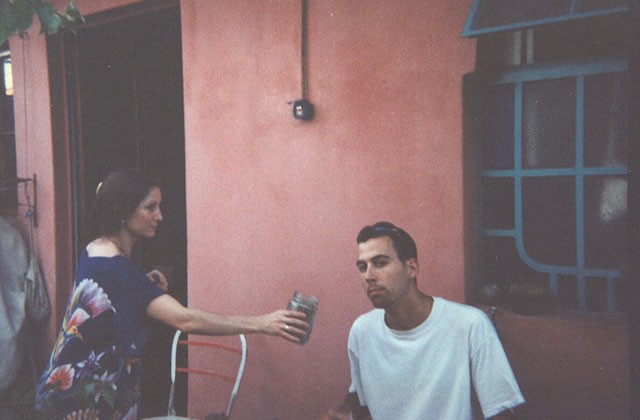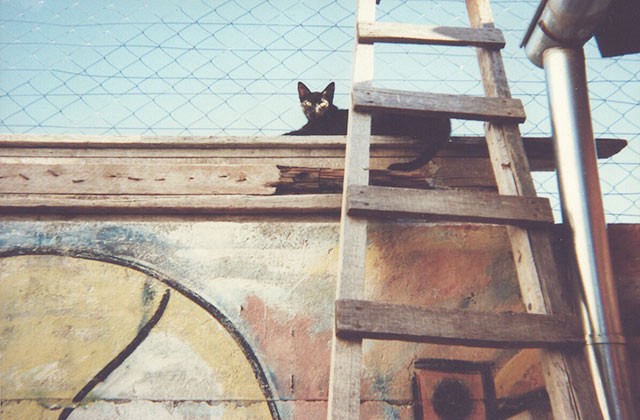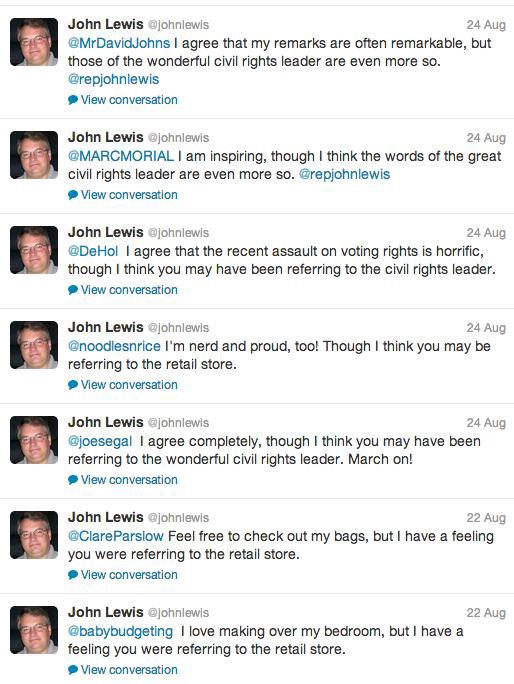The Age Of Wonder

“What a sad low-rent time we live in,” said some sage on Twitter the other night, and on mornings like this one it’s difficult to disagree.
Bayard Rustin, American Hero
Don’t know anything about Bayard Rustin? Let’s learn you up! Start here.
A Brief Guide To Tonight's Republican Mayoral Debate
WHICH OLD WHITE MAN WILL YOU PREFER? (Spoiler: it doesn’t really matter, just relax and enjoy the fun!)
Let Us Go Then

This begins the seven-episode Kindle Serial “An Experience Definitely Worth Allegedly Having: Travel Stories From The Hairpin.” (Episode Two, by Maria Bustillos, is excerpted here.)
I. Aerobics
Here is something weird I did when I lived in Buenos Aires: I did a lot of aerobics. My favorite class was at 6:30 p.m., and when I say it was my favorite I mean that I would plan afternoon and evening dates with friends around it, so that — no matter what — at six o’clock or so every night, I’d be in shorts and tennis shoes cutting across the traffic on Avenida Gaona, with the buses honking along and the late-afternoon light slanting, and the air turning gold and peachy. Gyms are gyms. The same soupy cooped-up smell when you walk in one everywhere. Flash a membership card at the front desk, bypass the weight machines downstairs with the bulky guys in their weight-lifting belts, and then climb a flight of stairs to the aerobics room. I’d sit in a corner of the room in a group with the other girls in my class and speak my deplorable Spanish to them and understand about half of what they chatted back to me while the 5:30 class finished, and then we would all get up and do step aerobics together. Step aerobics — that’s the kind where you leap up and down off little platforms — was huge at the time, and this class was the nutso apex, with these long, complex routines, and every so often the teacher would bark into her mic something like, “Now cut the routine in half and do it from the halfway point backward, and then return to the halfway point and go forward again, and then do it once more but this time straight through from start to finish.” If you’re a fellow former aerobics-goer, this is not an exaggeration. I have never been in another class like it: it was like doing a Sudoku that would sometimes make you vomit. But we all seemed to take this swooping martial Lost Boy joy in how hard it was, as if being good there would eventually lead to recruitment overseas as part of some elite fighting corps of step-aerobics masters (“Yeah, that’s right, I just grapevined all over your ass, motherfucker”).
Why did I love it so? There was this amazing, resounding clomp when we would all jump onto our steps at the same time. The windows would be open. It was salty pampas southern-hemisphere summer. At that time of day, traffic was ticking up outside. The sidewalks were filled with all these guys (young boys, teenagers, middle-aged men) in groups of twos and threes and fours on their way to play soccer. How many hidden soccer fields around the city to hold all the amateur male soccer players of Buenos Aires? Some astounding number. On the corner was an Esso, with red-and-blue branding just like an American Exxon, but also a place with tables where you might go hang out and eat ice cream. (I spent Christmas Day reading there, because it was open and air-conditioned.) Everyone else would have their doors and windows open, too, all along the street. The lady who ran the block’s little market would be standing outside, and her son would be racing back and forth up and down the sidewalk. You could see the bakery, and the one produce stand that was okay but you were probably better off walking up a couple blocks and over one street to the next one. However, the very best thing on the block was Soul Pizza, which was a completely ordinary Italian restaurant like hundreds of others across Buenos Aires except for its name, which, again, was Soul Pizza. I’m not sure why, as no one associated with it spoke English, and my contribution to the great ongoing exchange of pageantry and cultural understanding between the earth’s nations was to teach people I knew (Argentines, Koreans, Germans, Brazilians, etc.) to call it Souuuuullll Pizza, like the announcer at the beginning of Soul Train, and this restaurant was manned by two laconic silver-haired Italian dudes in their sixties with identical beaky noses (brothers, I assumed), who seemed to like me mostly because I never asked them to change the TV channel from what they were watching, and to whom I had once sung out, in a moment of misplaced confidence in my Spanish, “You were terrific tonight!” when I meant, “The meal was terrific tonight!” so it came out sounding like a sexual innuendo, and we were all three sort of startled. And in this neighborhood — not rich not poor not fashionable but slightly frumpy and comfortable — I belonged for that one upside-down summer in some goofy, provisional way, such that when I walked around I felt, after the first couple of months, what a foreigner hopes to feel, which is completely and wonderfully unremarkable. Just another part of the landscape.

II. Metamorphosis
This was 1996. I was twenty-five years old. No email, no Facebook; it cost a dollar a minute to talk to me, so every phone call from the United States was a big event. I told everyone I was in Buenos Aires to write a novel, and that was halfway true. But the entire truth was, I’d had a wretched breakup in Asheville, North Carolina, where I’d been living. Shortly after the breakup, an old college friend, Herschel, had phoned and said he’d won a Fulbright to live in Buenos Aires for a year to study Borges. He was over-the-moon excited. At the end of the call he added, almost as an afterthought, “Hey, maybe you should come, too,” and I immediately said, “Yes.” Not “Oh maybe! That sounds fun,” but just “Yes, I’ll go.” It had to have been bewildering, like putting an exploratory line in the water and instead of feeling a tentative tug back, a fish leaps out of the water and onto your boat and says, “Oh my god, I had to get out of there, where are we headed?”
I was gone, all in all, about seven months — two months at a language school in Quetzaltenango (or Xela, pronounced Shay-la), Guatemala, and five months in Argentina, with a couple of side trips during that time to Uruguay and Chile. As a travel arc, yoking Guatemala with Argentina didn’t make much sense — I had to fly back to Miami to get from one country to the other — but I wanted to see Guatemala. It seemed like a place that people I knew were constantly rappelling back and forth to, and this way I could learn a little Spanish. (I spoke only high-school French, which was great for making obscure Isabelle Adjani jokes but was otherwise fairly useless here.) The detour to Guatemala also meant I’d do a leg of the trip on my own so I wouldn’t be wilting all over my friend when I got to Argentina. After I bought my plane tickets and paid the school tuition, I had about $4,000 left, an amount I’d somehow squirreled away from a couple of dreary writing and editing jobs, and that, along with a little money from tutoring English in Buenos Aires, is what I lived off. I looked scraggly by the end, but I managed it. I’d spent the year before reading through the Carlos Fuentes shelf at the Asheville library, and I was halfway through the Mario Vargas Llosa shelf. My knowledge of Latin American literature was broad and, to anyone well versed, surely shallow, but my interest and admiration were entirely sincere. I was reading a lot of Gabriel García Márquez (and Rushdie, and Angela Carter, who felt like English-language cousins, once and twice removed), and I wanted to do what they were doing — something big and bursting — and in that context learning Spanish and sitting in a room in Argentina to write a novel about Wisconsin made sense, at least to me.
Still, it was all a little drastic and randomly chosen.
There’s that thing in Greek myths where a person, often a woman, becomes something else. She was a woman and then she’s a white cow. Or one day she’s a woman and then she’s a fish, a tree, a spider, a stream. That’s the closest I can come to describing the breakup I’d had. Unlike most things, it never became a funny story. There was a before and an after. Things had gone well and then they hadn’t. He loved me and then he didn’t. When I think of that time, it’s as this person who didn’t know who or what she was now. I felt a thousand years old. I felt creaky. I didn’t expect the trip to change that, and it didn’t, but it seemed like a chance to see what this new thing I had become was. While I was away I thought about my old boyfriend continually. It became a habit to think of him almost as if he could see me, to wonder if he was imagining where I was and what I was doing, and to see myself in that moment the way he might see me — and to judge myself accordingly. So even though we weren’t in touch and he probably wasn’t wondering, it became very important to me that entire trip to appear to be doing just great. How are you doing, young woman, in your new life as a fish/a spider/a tree? A-OK. Just fine. Completely good. I haven’t had a real conversation in days, but I know where the bus stops are and I know how to get places, I can march around the neighborhood every morning with the landlady’s dog and people wave hello to me. I’ve gotten really good at aerobics, did I tell you?
***
Want more? The full story is available via Amazon, for $1.99, which covers the rest of the seven-episode Serial, too.
More of Carrie’s pictures can be found on the collection’s [also free!] companion Tumblr.
Carrie Frye is a writer and former managing editor of The Awl. She tumbls at tinglealley.com and tweets @caaf.
New York City, August 26, 2013

★★ Moderate, but not at all crisp. After a dark start, clouds thinned out, changing from a dimming shade to a blinding diffuser. The sun was going to take over, and then it wasn’t, settling instead on casting a thin beige light over the afternoon. Gradually things went to gray again, and a tentative rain started. A vendor gathered up his cardboard LP sleeves from their places against the fence of the Golden Swan Garden. A one-stop subway ride, and the rain was gone again; things cleared without really clearing. An insect had gotten into the train car on the way back uptown. A big moth or something. It swooped down and slammed into the ceiling as the mid-car standing passengers ducked and flinched; you might have thought it was a bat, with the carrying on.
Willis Earl Beal, "Coming Through" (Featuring Chan Marshall)
You know what? Just play this sucker and enjoy it. Let’s not complicate things. [Via]
Modern-Day Version Of Three Bears Pretty Awesome
“Volkan T., the bodybuilder who partied in his underpants on an empty government jet used by Chancellor Angela Merkel, was found sleeping in her bed when police finally entered the plane to get him off, Germany’s Bild newspaper reported on Tuesday.”
Garbage Ample
So long as we’re gonna destroy the planet anyway we may as well be alert while it’s happening. [Via]
Four People Whose Twitter Lives Are A Nightmare
by Chris Stokel-Walker

1. The guy mistaken for a game developer
@jeb I think I found a bug when ever i open an enderchest it opens and closes continuously
Jeb Boniakowski is one of the lucky few people who possess a short, apposite Twitter handle directly related to his name: he’s just @jeb.
He’s also one of the unlucky people who happens to share his Twitter name with someone or something else that people tend to tweet at on accident.
The other-world Jeb that Boniakowski is often confused for isn’t even called Jeb. Well, he is, after a fashion. Jeb is the nickname for Jens Bergensten, one of the main developers of Minecraft. You might’ve heard of the game. Nearly 12 million people have. Between 10,000 and 15,000 people buy it every 24 hours.
Boniakowski’s kind of glad about the confusion: “I don’t know if I’d really know anything about Mojang [the company behind Minecraft] or Notch [its creator] if it wasn’t for this accident, and now I really admire them a lot. So there’s maybe a manufactured serendipity angle to it? At the end of the day isn’t that a lot of the reason we make stuff like Twitter accounts?”
But still: 15,000 people a day are coming into this world. Jeb — the real Jeb, not the nicknamed game developer — is swimming against that mass of humanity who play the game, want new features but aren’t aware that the Jeb they’re looking for tweets at @jeb_. That Jeb has nearly 770,000 followers, at the latest count, and they’re quite demanding of him, if this selection of tweets is anything to go by.
“My favorite people are the mothers,” Boniakowski wrote in an email. Yup: Hyped up teen gamers often go crying to mom when their Minecraft game corrupts. “Every once in a while I get a mother who is tweeting at me on behalf of their son who plays Minecraft. It will be like ‘@Jeb My sweet Kayden lost his save game file pls reply w/ help immediately.’ Every once in a long while they’ll be get super mad and be like ‘@JEB I HAVE ALREADY ASKED YOU THREE TIMES TO FIX MY SON KAYDENS MINECRAFT SAVEGAME FILE IF YOU DO NOT REPAIR THIS IMMEDIATELY I WILL REPORT YOU TO THE POLICE!!!’ Those kids are gonna have rough lives.”
Boniakowski engages in gentle trolling of some people who tweet at him, while for others he’ll offer advice like “try turning your computer on and off again”: “Every once in a while they’ll be like, ‘Thanks that fixed it right up!’ I think that’s hilarious.”
He’d never give up his Twitter handle. “It’s my goddamn name,” he wrote. “Mostly it’s super cheesedicks like small town politicians and people whose twitter bios say ‘Sales Training Professional’ who are like ‘I’d like your twitter handle. I think it could help my [campaign|business|church].’ And I’m like, ‘Oh yeah? Well I’d like your car, fuckface. How delusional are you that you think because you would like to have something, someone else who has it will give it to you?’”
But it gets worse.
2. The dude mistaken for a racist-nationalist group
@jana_salem @IreneZempi @EdL THE EDL ARE THE NEW AGE NAZIS AND A PAEDOPHILE RING FOR ONLY WHITE NONCES #EDL NEEDS TO BE CRUSHED
The English Defence League (EDL) was formed in 2009. They describe themselves as a “#WorkingClass movement who take to the streets against the spread of #islamism.” A group calling itself @EDLNews was created to oppose them — “Bringing you the news that the English Defence League often won’t.” Finally, Edward L (he’d rather not give his last name) was formed by the mingling of sperm with an egg 27 years ago. His Twitter handle is @EdL. You can see where this goes bad.
“I liked [the Twitter handle] because it’s short and easy to remember,” Ed explained. This is part of the problem. The EDL can rile people up, and angry people often don’t double check that the user they’re calling a racist pig is the right racist pig. (Kidding, Ed!) Ed’s username is “EdL,” but, of course, that’s just EDL.
Every day Ed wakes up and will have a few more @-notifications from people unwittingly calling him racist (or right-wingers tweeting messages of support for the group). “I turned off email notifications a long time ago,” he wrote.
In the immediate aftermath of the killing of Lee Rigby on the streets of London in May 2013, those few tweets a day became a torrent. (The incident ripped off the Band-Aid of progress in interfaith relations in the UK and left a gaping wound; for a couple of days it looked like Britain was kind of falling apart. Right-wing groups rallied support, and there were clashes on the street. Mosques were bombed, and Muslims attacked.)
“Sometimes I’m tempted to weigh in on the debates,” Ed said, “but it doesn’t feel like Twitter is the right platform for it. Also the tweets tend to be at the extreme end of the scale.”
Ed’s a politics graduate, the ultimate irony of ironies. And though his friends tell him that it’d be much easier if he just relinquished the account to the EDL, he’s not prepared to do that. “I’ve had my account for over five years,” he explained. “It existed before the EDL were started, and the abuse isn’t directed at me. Why would I be bothered by it?”
3. The woman mistaken for a soccer club
I AM NOT A FOOTBALL CLUB
— @chelsea
Even as I was talking to Chelsea Henry (@chelsea), Manchester United was playing Chelsea in a crucial early-season Premier League soccer match. “My @mentions right now are INSANE,” she told me on GChat.
I looked at the real time results for @Chelsea and she was not wrong. “CRAZY CRAZY dude,” she types. “I didn’t know people were that horrible at Twitter.”
Henry’s married to a Brit, so she’s aware of the potential confusion. Chelsea FC are one of the world’s biggest soccer clubs, and get an awful lot of mentions on social media. But they weren’t quick enough off the mark to snag @Chelsea for their team.
Henry’s husband worked at Twitter at the time, and managed to secure her the short, single-name handle. Those of us blessed with more complicated names don’t suffer from this problem: there aren’t a cavalcade of Choires, or a small army of Stokel-Walkers to get confused with. But — sidebar! — look out; ask Lia Bulaong about the dangers of having a short first name as a Twitter handle:

Jeb and Lia should maybe… get to know each other?
“When Twitter added auto-complete on handles and mentioning it got bad — because people don’t really look at it,” Chelsea typed at me. “I wish it would be more obvious that they’re not mentioning the right people.”
Initially, when Twitter was relatively low-profile and small, the mentions weren’t a problem for Henry. But then as large corporations such as the soccer club began expanding their presence on Twitter, the wrongful mentions increased.
“It’s not so much a problem as it is kind of annoying,” she says. “I run a blog and am a photographer and lots of people send me @-mentions and it’s hard to find them” in amongst the soccer dross.
That means she can’t just ignore her @-mentions for 90 minutes every weekend when the team are playing — or when they do something newsworthy. She skims her feed and picks out the relevant mentions. Sometimes there are direct mentions of her that aim to make light of her situation. “Some people are really funny about it, some genuinely don’t know what they’re doing, some harass me.”
Quite often those aiming abuse at her will be shouted down by others. “I reply to some people,” she says,” but mostly I just ignore or block.”
Was joke for a hot min... but now i realise people who tweet @Chelsea instead of @ChelseaFC are idiots. Why cuss her too? She didn't do shit
I ask her whether she’s thought about ditching the username for something less popular: “I have and I haven’t. I wouldn’t give it up mostly because why should I? I’d rather just deal with it because at the end of the day what are a few extra tweets, ya know. It’s gonna happen no matter what the username is, if it’s common at least.”
4. The fellow mistaken for a department store
@tom7p It's all good. I'm now being mistaken for the civil rights leader, too. I wish I had @repjohnlewis class and @johnlewisretail money.
This whole fascination started for me with a man named John Lewis. Lewis lives in Blacksburg, VA, the former hometown of Google’s Eric Schmidt. Lewis also happens to share the name of one of the UK’s biggest department stores, and one bored afternoon on Twitter someone linked to his good-humored responses to misdirected tweets.
This is the curse of having a relatively common name, and being an early adopter on Twitter. Lewis joined Twitter in November 2007, back when it was possible to get prime usernames such as plain old @JohnLewis. (He’s forced the department store chain to the less superior @JohnLewisRetail.)
Lewis fascinated me because of the way an ordinary man can get caught up in the unbridled, scattergun anger of the ordinary person that has become common in the age of social media. We’re now able to complain at airlines, fast food joints, supermarkets and banks in a public forum and under 140 characters — and they feel obligated, as part of some PR push, to respond. That means people are increasingly tetchy over the smallest things (I’ve whined publicly to a train operator about faulty wifi on Twitter, just because). .
Lewis’ conundrum got even better when he started being confused for congressman and civil rights campaigner John Lewis (who tweets at @RepJohnLewis, for those keeping score). Still, he took it on the chin, though I’m certain I’d get tired of constant notifications telling me that someone was unhappy with my service, or that I’d given an inspiring speech. Lewis had a come-what-may attitude that I’m almost certain I wouldn’t have the patience for.
I don’t know that for certain, though, and I’m not going to ask him. It could be that John Lewis wakes up in the morning and dreads looking at his Twitter feed:All those people asking him about music choices and wanting to complain about staff.
Maybe all he wants to do is live his life without being attached to Twitter. After all, he gave up on the site five years ago. Maybe the misdirected tweets are dragging him back, forcing him to defend the good name of John Lewis of Blacksburg, VA, against the tweeting hordes.
And I’m part of the problem. Before I wrote this goofy story about John Lewis being confused for a department store, he had 321 followers. Now he has 359. Who’s to say that John Lewis doesn’t want to be left alone? Maybe John Lewis should be left alone.

Chris Stokel-Walker writes for The Economist, The Sunday Times, and BuzzFeed.
It Is Almost Time For Autumn Colds
“Colds in summertime can last for weeks, at times seemingly going away and then suddenly storming back with a vengeance, infectious-disease experts say. A winter cold, by contrast, is typically gone in a few days. The reason for the difference: Summer colds are caused by different viruses from the ones that bring on sniffling and sneezing in the colder months. And some of the things people commonly do in the summer can prolong the illness, like being physically active and going in and out of air-conditioned buildings.”
